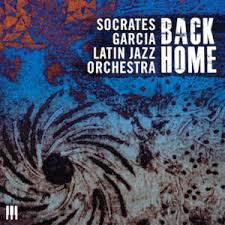As Socrates Garcia, the Dominican born creative force behind
his big band, the Socrates Garcia Latin Jazz Orchestra, explains in the liner
notes to its February release, Back Home,
the album has him “arriving to a place where I could combine my heritage with
the aesthetics of jazz” and move that combination “towards a promising future
for this symbiotic relationship.” Although the idea of creating such a
symbiotic relationship may not be particularly new, Garcia and his orchestra
bring it to life with dynamic force. Back
Home is top of the line big band Latin Jazz.
The seven-track album, all composed and arranged by Garcia,
begins with the high voltage “Vantage Point,” a tune based on the merengue that
runs close to nine minutes. It features Ryan Miiddagh on the baritone sax and
pianist Manuel Tejada as well as some real energy from the percussion section.
This is followed by “Calle El Conde a Las 8:00,” a composition that celebrates
the liveliness of what the composer remembers as a vibrant cultural neighborhood
of his youth. Will Swindler on soprano sax and Jordan Skomal on trumpet capture
the essence of the local scene.
The tenor sax of Kenyon Brenner highlights both “Celebration
of the Butterflies,” a salute to the Mirabel sisters, anti-Trujillo activists
assassinated in 1960 and the subjects of the novel and later the film In the Time of the Butterflies, and the
album’s title song.
Back Home closes
with a three-part suite entitled “Dominican Suite for Jazz Orchestra,” a major
piece much in the tradition of the famed big band suites of the Duke Ellington
Orchestra. The first part is “Homage to
Tavito.” Tavito Vasquez is a saxophonist, Garcia explains, revered as the
“Charlie Parker of the Caribbean.” Garcia uses it as an opportunity to explore
the symbiotic union of bebop and the merengue. “Bachata for Two” follows. The
bachata is a genre born in the countryside of the Dominican Republic and
sometime disparaged by the elites as peasant music. Garcia and the orchestra
demonstrate the folly of disparaging any musical genre. “From Across the
Street” concludes the album. It is the only track which includes a bit of vocal
work. It is based on Garcia’s memories of a woman from his infancy who used to
play a percussion dominated Dominican folk music called palos or atabales.
The suite provides a fine conclusion to Socrates Garcia’s
jazz soaked tribute to his homeland.


No comments:
Post a Comment